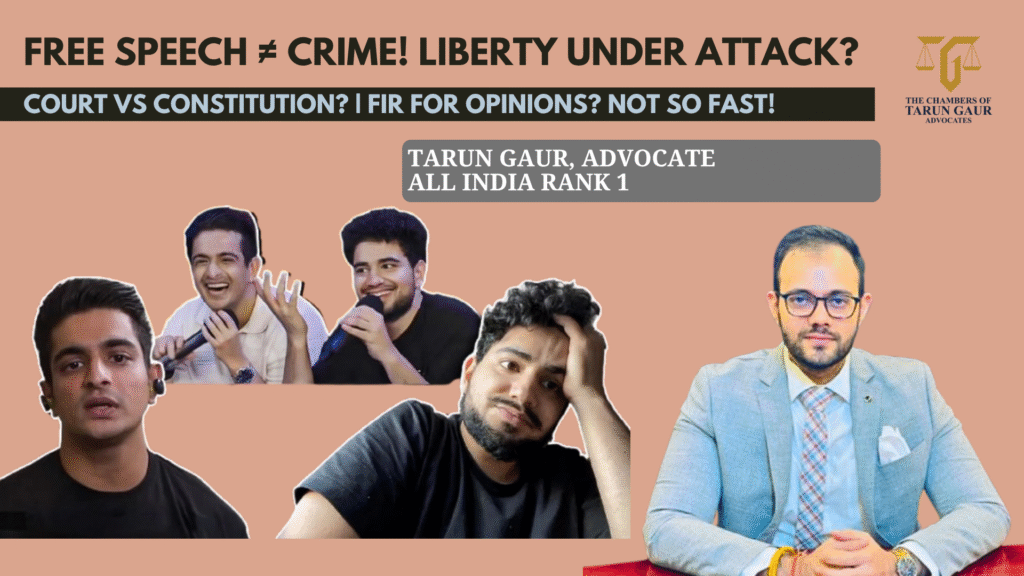🔍 Recent Developments in Free Speech Jurisprudence
1️⃣ Supreme Court Quashes Imran Pratapgarhi FIR
On March 28, 2025, the Supreme Court of India quashed an FIR against Congress MP Imran Pratapgarhi, registered by Gujarat Police for his Instagram post featuring the poem “Ae khoon ke pyase baat suno”.
The bench of Justices Abhay Oka and Ujjal Bhuyan observed that the post did not constitute any criminal offence, despite public outrage. The Court strongly reinforced that freedom of speech and expression is a cornerstone of dignified life under Article 21, and that courts must protect this right even when they personally disagree with the content.
The Court also reminded the police that registering FIRs for expression must be based on the “strong-minded, courageous citizen” test, not on fragile sensibilities or political discomfort.
2️⃣ Andhra Pradesh High Court’s Directive to Magistrates
On July 5, 2025, the Andhra Pradesh High Court issued a landmark circular to all judicial magistrates:
-
Strict compliance with Arnesh Kumar guidelines (2014) is mandatory before remanding anyone, especially for social media posts.
-
The Court specifically invoked the Imran Pratapgarhi ruling, warning magistrates that unnecessary remands or FIRs in free speech cases will attract contempt of court and departmental action.
-
Magistrates must check:
✅ Whether multiple offences are made out
✅ Whether custody is genuinely required
✅ Whether the accused may tamper with evidence or influence witnesses
⚖️ What About the Ranveer Allahbadia & Samay Raina Case?
The recent Ranveer Allahbadia (“BeerBiceps”) and Samay Raina controversy over their edgy podcast episode resulted in multiple FIRs across states. The Supreme Court granted interim protection from arrest, but unfortunately, the Court’s tone was more moralistic than principled.
-
The judges labelled the content “filthy,” “disgusting,” and “depraved”
-
The Court asked for new content regulation frameworks for digital creators
-
No FIRs to be registered further, but the right to offend was not robustly defended
-
Creators were asked to surrender passports and tone down their content
In contrast to the Pratapgarhi judgment, here the Court leaned into moral policing, which raises concerns about consistency in protecting free speech.
💥 My Fierce Take—Liberty Must Be Non-Negotiable
As Advocate Tarun Gaur, a criminal lawyer in Delhi, I say this loud and clear:
Liberty is not a privilege; it is a right.
Especially when the alleged offence stems from speech, satire, or art, freedom must be the default—not the exception.
Courts must resist the temptation to act as moral gatekeepers. They are constitutionally obligated to protect citizens’ liberty first, personal distaste second. When we start attaching conditions to speech—“speak freely, but only if we like it”—we are no longer defending freedom; we are sanitizing dissent.
In my practice as an Advocate in Dwarka and as someone who fights for civil liberties, I have seen firsthand how frivolous FIRs are used as tools of harassment. When police overreach becomes the norm, Constitutional Courts must step in unapologetically.
I firmly believe that liberty is not to be curtailed easily, especially in cases involving free speech, digital expression, satire, or commentary. Whether it’s a poem, a joke, a podcast, or a meme, the law must stand on the side of expression, not censorship.
🏛️ Why This Matters
If we continue to blur the lines between legal accountability and moral policing, India risks sliding into a “chilling effect” on speech. Every citizen—whether a comedian, poet, podcaster, or politician—should feel safe to speak without the looming threat of jail.
As someone who practices in white collar crime, cyber law, and free speech cases, I strongly advocate for a robust, fearless defence of liberty. Courts must protect rights, not feelings.
✍️ About the Author
Advocate Tarun Gaur (All India Rank 1)
- Criminal Lawyer in Delhi, specializing in white collar crime, digital free speech, and cyber law cases
-
Regular commentator on constitutional rights and liberty jurisprudence.

